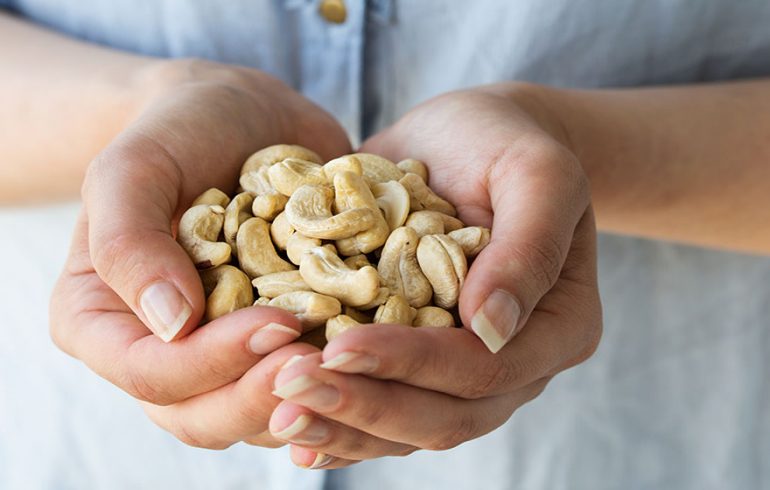The cashew tree grows in tropical climates and produces one of the world’s most versatile — and healthy — nuts: the cashew. The largest cashew tree in the world can be found in Brazil. It spans an area of about two acres — enough room to typically grow about 70 cashew trees.

Cashew Health Benefits and Nutrition Facts
1. Cashews are good for our eyes.
Move over carrots. One cup of these U-shaped nuts pack 8 micrograms of lutein and zeaxanthin, two powerful antioxidants that when eaten regularly protect eyes from light damage. They may also play a role in preventing age-related macular degeneration.
2. Cashews help breasts be their best.
Anacardic acid can help balance estrogen and cashews have lots of it. Eating a handful a day provides about 20 micrograms of anacardic acid, which researchers found can suppress hormone-sensitive breast cancer cells. So keep cashews handy for breast health and fending off other hormone-related illness.
3. Cashews provide large amounts of trace minerals.
One cup of cashews provides large amounts of trace minerals that are critical to keeping us healthy every day. They’re loaded with: copper (152% of our recommended daily intake), which supports proper cognitive function and lowers the risk of infection; magnesium to prevent muscle spasms and keep blood pressure in check; phosphorus and calcium for strong bones and teeth; and zinc to boost immunity and help injuries heal quickly.
4. Cashews are high in the right types of calories.
A 1/4 cup of cashews contain 3 grams of fiber, 15 grams of protein, 2 grams of iron and about 200 calories. While nuts are generally high in calories, they’re are packed with healthy fats along with fiber, protein and essential vitamins and minerals. In addition to their nutrition, nuts fill you up and may lead you to take in fewer calories. Keep the calories in check by sticking to one serving (1/4 to 1/3 cup). And if you’re watching your sodium intake, choose unsalted cashews.
Easy Ways to Add Cashews to Your Diet
Raw, unsalted cashews are common additions in Indian and Asian cuisine, so keep cashews in mind when you’re making curries and stirfrys. Cashews can also be used to make everything from butter to vegan cheeses, milk and cream sauces. So instead of high-fat Alfredo with your pasta, try soaking cashews overnight before throwing them into your food processor with salt, fresh water and lemon.
Food blogger, Carolyn Cope of Umami Girl makes cashew cream by blending raw cashews with water and substituting it in soup, smoothie and cake recipes that call for cream. Cope also dresses up cashew cream with a bit of maple syrup, cinnamon and nutmeg for a nutritious and delightful drizzle over oatmeal.
For a healthy and simple snack, try spreading cashew butter on an apple slice. Cashew butter is low on the glycemic index due to its protein, healthy oil and fiber, which helps control blood sugar levels. And if you’re looking for a decadent and sweet treat, you can’t go wrong with cashew brittle. Turn to Jenny and Alex of food blog Spoon Fork Bacon for their sea salt cashew brittle recipe.


